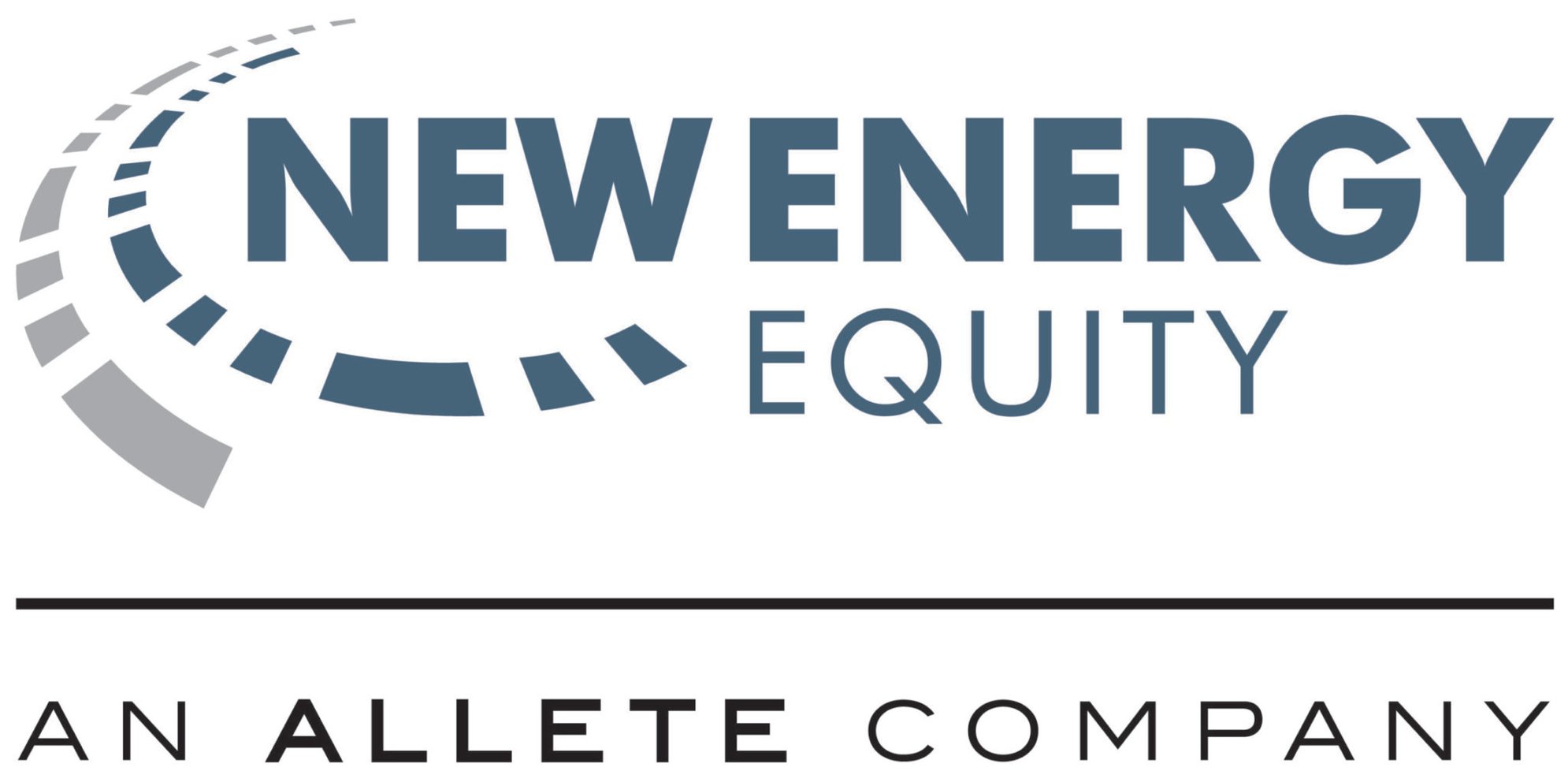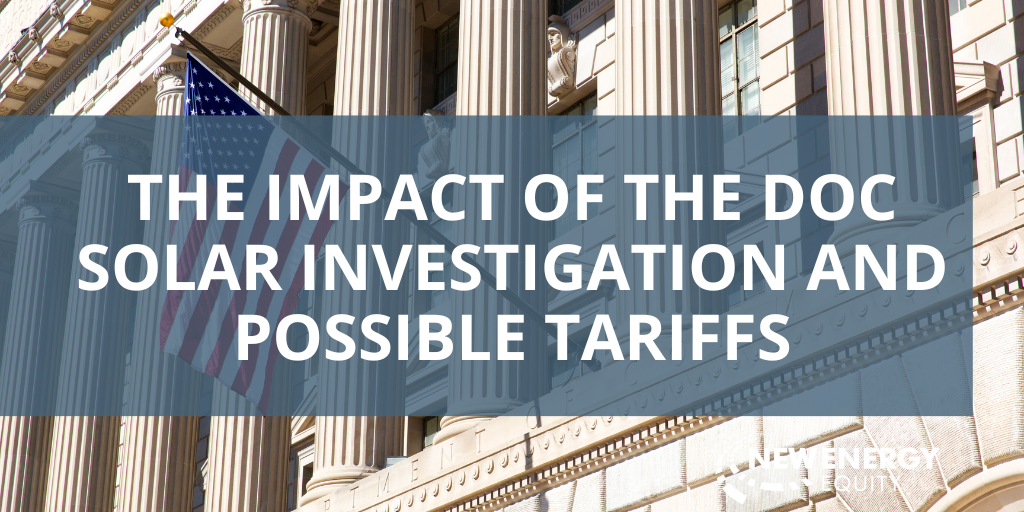New Energy Insights
- Home /
- New Energy Insights /
- The Impact of the DOC Solar Investigation and Possible Tariffs
April 2022 | Eric Hanson, Chief Operating Officer, Impact Power Solutions (now New Energy Equity
The DOC Solar Investigation is looking at possible circumvention of anti-dumping laws (AD/CVD) by imported solar modules and it's sparking uncertainty for US companies and the solar industry. IPS' (now New Energy Equity's) Chief Operating Officer, Eric Hanson, shares his insight on how the investigation is impacting the sourcing of these modules and the development of commercial solar projects. We ask him how our projects are going, what we're doing to avoid future issues, and how companies looking to adopt solar should react to this news.
What’s Being Reviewed in the DOC Solar Investigation
The US commerce department is analyzing a case brought by domestic manufacturer Auxin, which states that they and other domestic manufacturers have been harmed by companies importing panels below their true cost. A similar tariff has been on the books since 2012 which covers, of all things, washing machines and solar panels imported from China. The US government determined that panels and cells made were being sold at a below-market rate. Since that time there's been an 18-28% tariff against certain Chinese panel manufacturers. The new case alleges that manufacturers in other countries - Vietnam, Cambodia, Malaysia, and Thailand - are doing the same thing.
The Difference Between the DOC Solar Investigation and the Previous 201 Trade Tariffs
The previous section 201 trade tariff had a bi-facial exception, which basically meant that any bifacial panel was not subject to it. It was a pretty big tariff, about 30%, now it’s ramped down to roughly 15%. The DOC Solar Investigation is similar to the 2012 anti-dumping tariff. If this petition is accepted by the department of commerce, it would be retroactive, and very large, 50% - 250% on top of the price of these modules and retroactive to some point, possibly to the beginning of this year, or to March of this year. No panel manufacturer feels confident that if they deliver right now, it wouldn't be subjected to this tariff. It's created a freeze on panels across the industry, and not the kind of freeze we're accustomed to here in Minnesota.
Project and Product Delays
Projects are going great in 2022! It’s probably going to be one of the biggest years ever for IPS. The most significant delays we’re seeing are with inverters, lead times that are about double what we have been accustomed to. Instead of a typical 8-week delivery window, it's now 20-25 weeks. We’re also noticing certain inverter manufacturers that don't have any stock for the rest of the year. For the most part, though we've been able to pivot and find reliable manufacturers that we can use. At this point, we have not seen too many cancellations. You are able to install racking and inverters and wiring and conduit before you have modules, but we typically don't do things that way. We would never start a construction project without procuring the modules or knowing that we have a path to procure them at an agreed-upon price. Typically the delays are due to supply chain issues. With inverters, for instance, there are a lot of PCBs with microchips, and every industry is fighting for microchips at the moment. But the largest single issue for us right now is transportation- it’s either too expensive, which causes suppliers to decline shipping if their freight numbers (usually included in our price) or a lack of delivery drivers. In many instances, we can’t get products across the ocean to the US.
What We're Doing to Avoid Issues
North American panels are accessible to commercial installations, on a very limited basis. Typically the annual output is going to be a lot lower, so it’s pretty difficult to count on them to cover all of our needs throughout the year, knowing that there are quite a few companies like ours around the country. We have not looked into the secondary market, but we have looked at a lot of suppliers through Amicus, our solar buyers' cooperative. We have seen some supply due to canceled orders from larger companies. We’ve really tried to open up the old Rolodex and talk with as many reputable distributors as possible. I think we’ve done a pretty good job at locating inverters and racking - modules are the only item hanging out there. As of today we haven't had an issue locating modules, but I think that will likely change in the next couple of months.
How the DOC Solar Investigation will Impact the Commercial and Community Solar Market
If module supply is reduced by potentially 80% prices will go up. If that's the case on the community solar front we'll see delays as developers choose to wait out the current issues. For commercial customers, some will choose to move forward but many will wait out these problems as well. Both markets are less price-sensitive compared to utility-scale, with residential projects being even less price-sensitive than commercial and community-scale.
Implications for Companies Considering Solar
The biggest implication for any customer looking to install solar this year or next year is to act fast, to be very blunt. There are modules out there, we have a relatively solid supply of modules now, but that could change dramatically in the next several months if market dynamics do not change. If solar is a strategic initiative for your company this year or next year, due to the recent decision by the DOC, I would definitely say that you should act as soon as possible. If you have a proposal in front of you that makes financial sense, now is the time to do it and I think it’s going to get a little bit more uncertain as we move forward toward the end of 2022.
Is Solar a Strategic Initiative for Your Company? We Can Help.
If your company is considering sustainability initiatives, renewable energy, or energy efficiency improvements, we’re happy to hear from you. New Energy Equity has been helping organizations implement solar projects for over 30 years. If you’re interested in learning more or want to see how solar can work for your organization, reach out to us today!
Stay up-to-date with New Energy Equity by joining our mailing list.

